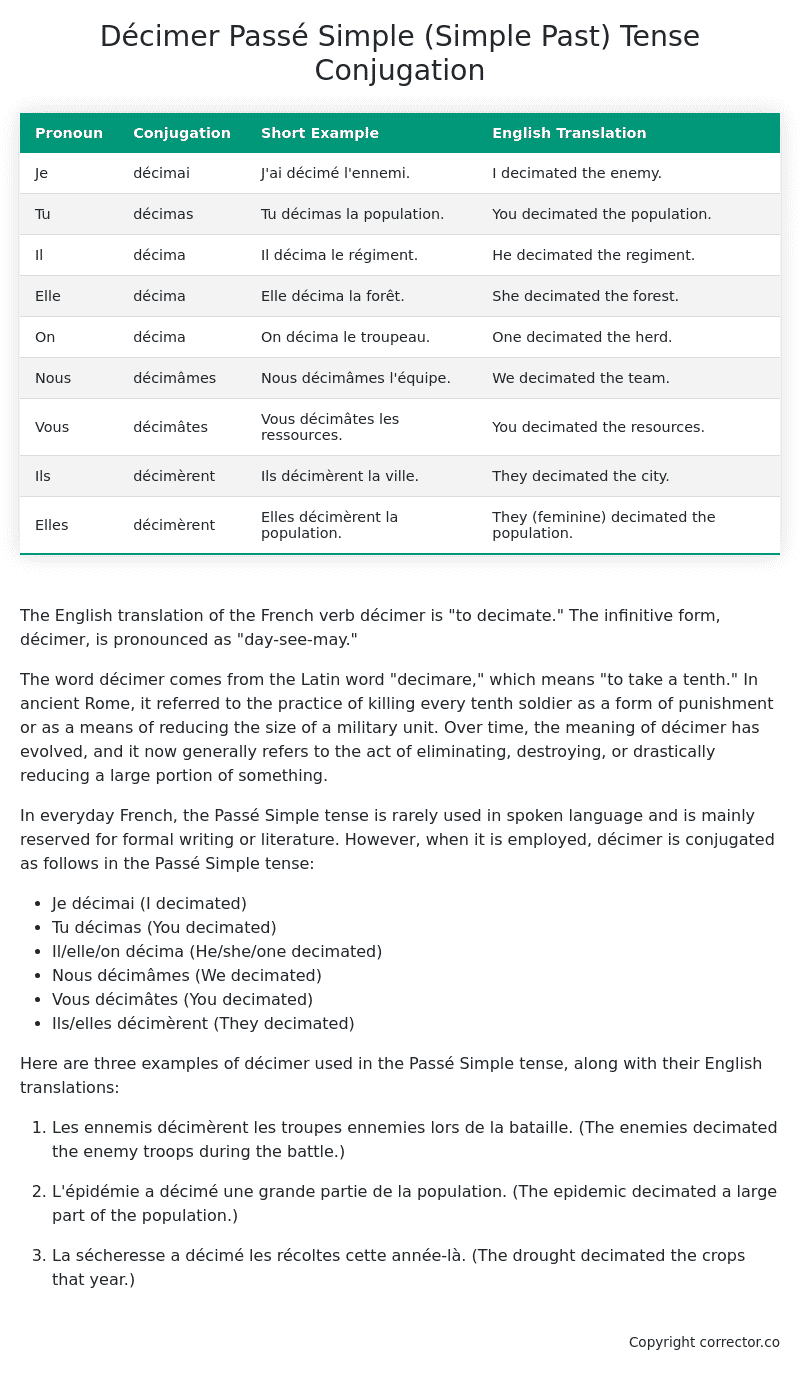Passé Simple (Simple Past) Tense Conjugation of the French Verb décimer
Introduction to the verb décimer
The English translation of the French verb décimer is “to decimate.” The infinitive form, décimer, is pronounced as “day-see-may.”
The word décimer comes from the Latin word “decimare,” which means “to take a tenth.” In ancient Rome, it referred to the practice of killing every tenth soldier as a form of punishment or as a means of reducing the size of a military unit. Over time, the meaning of décimer has evolved, and it now generally refers to the act of eliminating, destroying, or drastically reducing a large portion of something.
In everyday French, the Passé Simple tense is rarely used in spoken language and is mainly reserved for formal writing or literature. However, when it is employed, décimer is conjugated as follows in the Passé Simple tense:
- Je décimai (I decimated)
- Tu décimas (You decimated)
- Il/elle/on décima (He/she/one decimated)
- Nous décimâmes (We decimated)
- Vous décimâtes (You decimated)
- Ils/elles décimèrent (They decimated)
Here are three examples of décimer used in the Passé Simple tense, along with their English translations:
-
Les ennemis décimèrent les troupes ennemies lors de la bataille.
(The enemies decimated the enemy troops during the battle.) -
L’épidémie a décimé une grande partie de la population.
(The epidemic decimated a large part of the population.) -
La sécheresse a décimé les récoltes cette année-là.
(The drought decimated the crops that year.)
Table of the Passé Simple (Simple Past) Tense Conjugation of décimer
| Pronoun | Conjugation | Short Example | English Translation |
|---|---|---|---|
| Je | décimai | J’ai décimé l’ennemi. | I decimated the enemy. |
| Tu | décimas | Tu décimas la population. | You decimated the population. |
| Il | décima | Il décima le régiment. | He decimated the regiment. |
| Elle | décima | Elle décima la forêt. | She decimated the forest. |
| On | décima | On décima le troupeau. | One decimated the herd. |
| Nous | décimâmes | Nous décimâmes l’équipe. | We decimated the team. |
| Vous | décimâtes | Vous décimâtes les ressources. | You decimated the resources. |
| Ils | décimèrent | Ils décimèrent la ville. | They decimated the city. |
| Elles | décimèrent | Elles décimèrent la population. | They (feminine) decimated the population. |
Other Conjugations for Décimer.
Le Present (Present Tense) Conjugation of the French Verb décimer
Imparfait (Imperfect) Tense Conjugation of the French Verb décimer
Passé Simple (Simple Past) Tense Conjugation of the French Verb décimer (You’re reading it right now!)
Passé Composé (Present Perfect) Tense Conjugation of the French Verb décimer
Futur Simple (Simple Future) Tense Conjugation of the French Verb décimer
Futur Proche (Near Future) Tense Conjugation of the French Verb décimer
Plus-que-parfait (Pluperfect) Tense Conjugation of the French Verb décimer
Passé Antérieur (Past Anterior) Tense Conjugation of the French Verb décimer
Futur Antérieur (Future Anterior) Tense Conjugation of the French Verb décimer
Subjonctif Présent (Subjunctive Present) Tense Conjugation of the French Verb décimer
Subjonctif Passé (Subjunctive Past) Tense Conjugation of the French Verb décimer
Subjonctif Imparfait (Subjunctive Imperfect) Tense Conjugation of the French Verb décimer
Subjonctif Plus-que-parfait (Subjunctive Pluperfect) Tense Conjugation of the French Verb décimer
Conditionnel Présent (Conditional Present) Tense Conjugation of the French Verb décimer
Conditionnel Passé (Conditional Past) Tense Conjugation of the French Verb décimer
Conditionnel Passé II (Conditional Past II) Tense Conjugation of the French Verb décimer
L’impératif Présent (Imperative Present) Tense Conjugation of the French Verb décimer
L’impératif Passé (Imperative Past) Tense Conjugation of the French Verb décimer
L’infinitif Présent (Infinitive Present) Tense Conjugation of the French Verb décimer
L’infinitif Passé (Infinitive Past) Tense Conjugation of the French Verb décimer
Le Participe Présent (Present Participle) Tense Conjugation of the French Verb décimer
Le Participe Passé (Past Participle) Tense Conjugation of the French Verb décimer
Struggling with French verbs or the language in general? Why not use our free French Grammar Checker – no registration required!
Get a FREE Download Study Sheet of this Conjugation 🔥
Simply right click the image below, click “save image” and get your free reference for the décimer Passé Simple tense conjugation!

Décimer – About the French Passé Simple (Simple Past) Tense
Formation
Usage
Narration
Historical Context
Interactions with other tenses
Passé Composé
Imparfait
Conditional and Subjunctive
Summary
I hope you enjoyed this article on the verb décimer. Still in a learning mood? Check out another TOTALLY random French verb conjugation!


